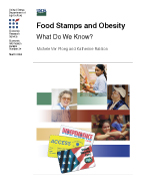Food Stamps and Obesity: What Do We Know?
- by Michele Ver Ploeg and Katherine Ralston
- 3/21/2008
Overview
Results from reviewed studies indicate that for most participants in the Food Stamp Program-children, nonelderly men, and the elderly-use of food stamp benefits does not result in an increase in either Body Mass Index (BMI) or the likelihood of being overweight or obese. However, for nonelderly women, who account for 28 percent of the food stamp caseload, some evidence suggests that participation in the Food Stamp Program may increase BMI and the probability of obesity. Different results for age and sex subgroups remain unexplained. Further, because food stamp benefits are issued to households, not individuals, mixed results across age and sex subgroups make it difficult to target policy alternatives to address potential weight gain among some participants while not affecting others in the household.
Download
-
Entire report
Download PDF -
Report summary
Download PDF


